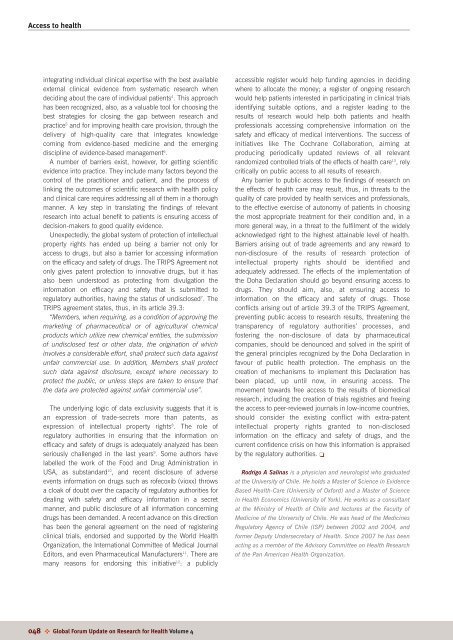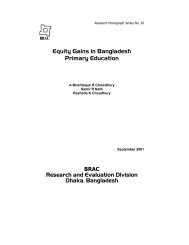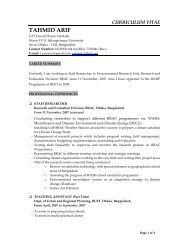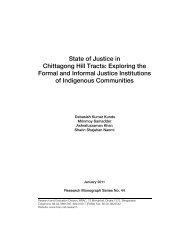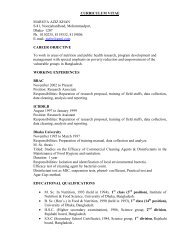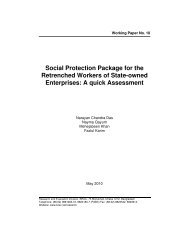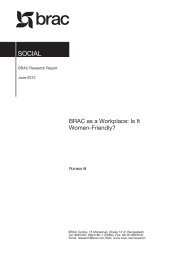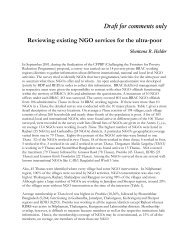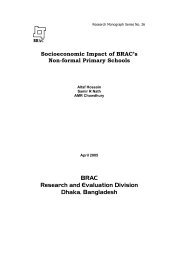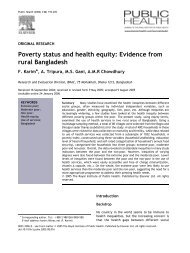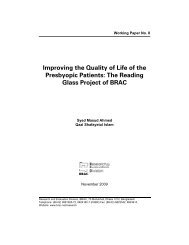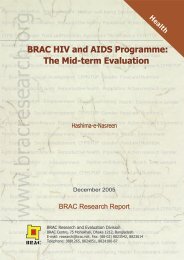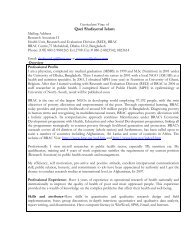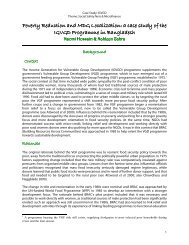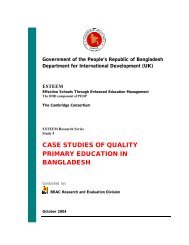Combining health and social protection measures to reach the ultra ...
Combining health and social protection measures to reach the ultra ...
Combining health and social protection measures to reach the ultra ...
You also want an ePaper? Increase the reach of your titles
YUMPU automatically turns print PDFs into web optimized ePapers that Google loves.
Access <strong>to</strong> <strong>health</strong><br />
integrating individual clinical expertise with <strong>the</strong> best available<br />
external clinical evidence from systematic research when<br />
deciding about <strong>the</strong> care of individual patients 4 . This approach<br />
has been recognized, also, as a valuable <strong>to</strong>ol for choosing <strong>the</strong><br />
best strategies for closing <strong>the</strong> gap between research <strong>and</strong><br />
practice 5 <strong>and</strong> for improving <strong>health</strong> care provision, through <strong>the</strong><br />
delivery of high-quality care that integrates knowledge<br />
coming from evidence-based medicine <strong>and</strong> <strong>the</strong> emerging<br />
discipline of evidence-based management 6 .<br />
A number of barriers exist, however, for getting scientific<br />
evidence in<strong>to</strong> practice. They include many fac<strong>to</strong>rs beyond <strong>the</strong><br />
control of <strong>the</strong> practitioner <strong>and</strong> patient, <strong>and</strong> <strong>the</strong> process of<br />
linking <strong>the</strong> outcomes of scientific research with <strong>health</strong> policy<br />
<strong>and</strong> clinical care requires addressing all of <strong>the</strong>m in a thorough<br />
manner. A key step in translating <strong>the</strong> findings of relevant<br />
research in<strong>to</strong> actual benefit <strong>to</strong> patients is ensuring access of<br />
decision-makers <strong>to</strong> good quality evidence.<br />
Unexpectedly, <strong>the</strong> global system of <strong>protection</strong> of intellectual<br />
property rights has ended up being a barrier not only for<br />
access <strong>to</strong> drugs, but also a barrier for accessing information<br />
on <strong>the</strong> efficacy <strong>and</strong> safety of drugs. The TRIPS Agreement not<br />
only gives patent <strong>protection</strong> <strong>to</strong> innovative drugs, but it has<br />
also been unders<strong>to</strong>od as protecting from divulgation <strong>the</strong><br />
information on efficacy <strong>and</strong> safety that is submitted <strong>to</strong><br />
regula<strong>to</strong>ry authorities, having <strong>the</strong> status of undisclosed 7 . The<br />
TRIPS agreement states, thus, in its article 39.3:<br />
“Members, when requiring, as a condition of approving <strong>the</strong><br />
marketing of pharmaceutical or of agricultural chemical<br />
products which utilize new chemical entities, <strong>the</strong> submission<br />
of undisclosed test or o<strong>the</strong>r data, <strong>the</strong> origination of which<br />
involves a considerable effort, shall protect such data against<br />
unfair commercial use. In addition, Members shall protect<br />
such data against disclosure, except where necessary <strong>to</strong><br />
protect <strong>the</strong> public, or unless steps are taken <strong>to</strong> ensure that<br />
<strong>the</strong> data are protected against unfair commercial use”.<br />
The underlying logic of data exclusivity suggests that it is<br />
an expression of trade-secrets more than patents, as<br />
expression of intellectual property rights 8 . The role of<br />
regula<strong>to</strong>ry authorities in ensuring that <strong>the</strong> information on<br />
efficacy <strong>and</strong> safety of drugs is adequately analyzed has been<br />
seriously challenged in <strong>the</strong> last years 9 . Some authors have<br />
labelled <strong>the</strong> work of <strong>the</strong> Food <strong>and</strong> Drug Administration in<br />
USA, as subst<strong>and</strong>ard 10 , <strong>and</strong> recent disclosure of adverse<br />
events information on drugs such as rofecoxib (vioxx) throws<br />
a cloak of doubt over <strong>the</strong> capacity of regula<strong>to</strong>ry authorities for<br />
dealing with safety <strong>and</strong> efficacy information in a secret<br />
manner, <strong>and</strong> public disclosure of all information concerning<br />
drugs has been dem<strong>and</strong>ed. A recent advance on this direction<br />
has been <strong>the</strong> general agreement on <strong>the</strong> need of registering<br />
clinical trials, endorsed <strong>and</strong> supported by <strong>the</strong> World Health<br />
Organization, <strong>the</strong> International Committee of Medical Journal<br />
Edi<strong>to</strong>rs, <strong>and</strong> even Pharmaceutical Manufacturers 11 . There are<br />
many reasons for endorsing this initiative 12 : a publicly<br />
accessible register would help funding agencies in deciding<br />
where <strong>to</strong> allocate <strong>the</strong> money; a register of ongoing research<br />
would help patients interested in participating in clinical trials<br />
identifying suitable options, <strong>and</strong> a register leading <strong>to</strong> <strong>the</strong><br />
results of research would help both patients <strong>and</strong> <strong>health</strong><br />
professionals accessing comprehensive information on <strong>the</strong><br />
safety <strong>and</strong> efficacy of medical interventions. The success of<br />
initiatives like The Cochrane Collaboration, aiming at<br />
producing periodically updated reviews of all relevant<br />
r<strong>and</strong>omized controlled trials of <strong>the</strong> effects of <strong>health</strong> care 13 , rely<br />
critically on public access <strong>to</strong> all results of research.<br />
Any barrier <strong>to</strong> public access <strong>to</strong> <strong>the</strong> findings of research on<br />
<strong>the</strong> effects of <strong>health</strong> care may result, thus, in threats <strong>to</strong> <strong>the</strong><br />
quality of care provided by <strong>health</strong> services <strong>and</strong> professionals,<br />
<strong>to</strong> <strong>the</strong> effective exercise of au<strong>to</strong>nomy of patients in choosing<br />
<strong>the</strong> most appropriate treatment for <strong>the</strong>ir condition <strong>and</strong>, in a<br />
more general way, in a threat <strong>to</strong> <strong>the</strong> fulfilment of <strong>the</strong> widely<br />
acknowledged right <strong>to</strong> <strong>the</strong> highest attainable level of <strong>health</strong>.<br />
Barriers arising out of trade agreements <strong>and</strong> any reward <strong>to</strong><br />
non-disclosure of <strong>the</strong> results of research <strong>protection</strong> of<br />
intellectual property rights should be identified <strong>and</strong><br />
adequately addressed. The effects of <strong>the</strong> implementation of<br />
<strong>the</strong> Doha Declaration should go beyond ensuring access <strong>to</strong><br />
drugs. They should aim, also, at ensuring access <strong>to</strong><br />
information on <strong>the</strong> efficacy <strong>and</strong> safety of drugs. Those<br />
conflicts arising out of article 39.3 of <strong>the</strong> TRIPS Agreement,<br />
preventing public access <strong>to</strong> research results, threatening <strong>the</strong><br />
transparency of regula<strong>to</strong>ry authorities’ processes, <strong>and</strong><br />
fostering <strong>the</strong> non-disclosure of data by pharmaceutical<br />
companies, should be denounced <strong>and</strong> solved in <strong>the</strong> spirit of<br />
<strong>the</strong> general principles recognized by <strong>the</strong> Doha Declaration in<br />
favour of public <strong>health</strong> <strong>protection</strong>. The emphasis on <strong>the</strong><br />
creation of mechanisms <strong>to</strong> implement this Declaration has<br />
been placed, up until now, in ensuring access. The<br />
movement <strong>to</strong>wards free access <strong>to</strong> <strong>the</strong> results of biomedical<br />
research, including <strong>the</strong> creation of trials registries <strong>and</strong> freeing<br />
<strong>the</strong> access <strong>to</strong> peer-reviewed journals in low-income countries,<br />
should consider <strong>the</strong> existing conflict with extra-patent<br />
intellectual property rights granted <strong>to</strong> non-disclosed<br />
information on <strong>the</strong> efficacy <strong>and</strong> safety of drugs, <strong>and</strong> <strong>the</strong><br />
current confidence crisis on how this information is appraised<br />
by <strong>the</strong> regula<strong>to</strong>ry authorities. ❏<br />
Rodrigo A Salinas is a physician <strong>and</strong> neurologist who graduated<br />
at <strong>the</strong> University of Chile. He holds a Master of Science in Evidence<br />
Based Health-Care (University of Oxford) <strong>and</strong> a Master of Science<br />
in Health Economics (University of York). He works as a consultant<br />
at <strong>the</strong> Ministry of Health of Chile <strong>and</strong> lectures at <strong>the</strong> Faculty of<br />
Medicine of <strong>the</strong> University of Chile. He was head of <strong>the</strong> Medicines<br />
Regula<strong>to</strong>ry Agency of Chile (ISP) between 2002 <strong>and</strong> 2004, <strong>and</strong><br />
former Deputy Undersecretary of Health. Since 2007 he has been<br />
acting as a member of <strong>the</strong> Advisory Committee on Health Research<br />
of <strong>the</strong> Pan American Health Organization.<br />
048 ✜ Global Forum Update on Research for Health Volume 4


